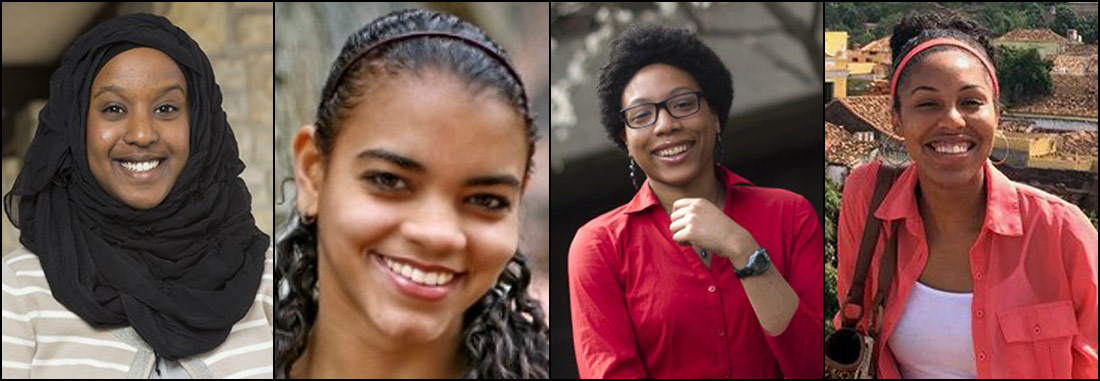
The scholarships were created in 1902 by the will of Cecil Rhodes, an industrialist who made a vast fortune in colonial Africa. According to the will of Rhodes, applicants must have “high academic achievement, integrity of character, a spirit of unselfishness, respect for others, potential for leadership, and physical vigor.”
In 1907 Alain LeRoy Locke, later a major philosopher and literary figure of the Harlem Renaissance, was selected as a Rhodes Scholar to study at Oxford University. It is generally believed that at the time of the award the Rhodes committee did not know that Locke was Black until after he had been chosen. It would be more than 50 years later, in 1962, until another African American would be named a Rhodes Scholar. That year, John Edgar Wideman, now a famed author as well as a professor at Brown University, was selected. Other African Americans who have won Rhodes Scholarships include Randall Kennedy of Harvard Law School, Kurt Schmoke, former mayor of Baltimore, and Franklin D. Raines, former director of the Office of Management and Budget and former CEO of Fannie Mae. In 1978 Karen Stevenson of the University of North Carolina at Chapel Hill was the first African-American woman selected as a Rhodes Scholar.
This year’s class of Rhodes Scholars was chosen from a pool of 869 students who were endorsed by 316 different colleges and universities. There were 208 finalists from 93 colleges and universities that were selected in 16 different geographic districts. Two students from each district were chosen as Rhodes Scholars. Students can enter the competition in the district in which they reside or the district where they attended college.
Of this year’s 32 American Rhodes Scholars, it appears that four are African Americans. All four are women.

Ilhan A. Dahir is a graduate of Ohio State University with a bachelor’s degree in English and political science. She is now teaching English in Turkey as a Fulbright Fellow. Dahir is the daughter of Somali immigrants. Dahir plans to earn two master’s degrees at Oxford, one on refugee and forced migration studies and one in global governance and diplomacy.
Jennifer C. Hebert is a senior at the University of Pennsylvania, majoring in the biological basis of behavior. She is a member of the university’s rowing team and the U.S. national rowing team. Her senior thesis involves research on the effects of nicotine exposure or stress on neural circuitry. Hebert will study for a master’s degree in psychiatry at Oxford.
Logan C. Jackson from Lexington, Kentucky, is a senior at Northeastern University in Boston, majoring in structural engineering. She has a perfect grade point average so far in her undergraduate career. Jackson is president of the Northeastern University chapter of the National Society of Black Engineers. She plays the viola in the university’s symphony orchestra. At Oxford, Jackson plans to study for a master’s degree in education and a master’s degree in evidence-based social intervention and policy.
Ericka M. Wheeler is the first African American woman from the state of Mississippi to win a Rhodes Scholarship. She is a senior at Millsaps College in Jackson, Mississippi. She is majoring in history and English and also taking a pre-med curriculum. Wheeler is co-president of the Millsaps College Gospel Choir and president of the Intercultural Student Organization. Wheeler plans to study for a master’s degree in medical anthropology at Oxford.


This is a wonderful example for young women to see. It will be inspirational for some that need to see someone who looks like them to believe they can do anything.
My sincere congratulations to these exceptional young women. Once again they prove that if given the chance, we can do as well, if not better, than anyone else. Of course, this stokes the insecurities of the “others”. To the young ladies, you are a shining example of the potential that your generation holds. Keep up the good work.
Sad….I guess many don’t know Cecil Rhodes and what he stands for and what he created his scholarship for…but I also know many don’t care
Yes, many know about Rhodes and his history, and it is good to let others be aware of it; yet, if one were to decide to not avail oneself of any resources that at one time or another passed through the hands of a racist seeking/espousing/actively promoting ethnic imperialism, or of any resources that were amassed as ill gotten gains off of the backs of slaves, exploited workers, or the like, it may mean availing oneself of practically nothing; it may also mean refusing resources created by one’s forebears. The challenge is to use those resources to redress circumstance, to right the course of history, and to be a beacon of what is right. Kudos to the young women and let us wish them well, not cloud their path before they are out of this starting block.
I could not agree more.
I agree…thank you for explaining that!!!
Congratulations. In the spirit of Dr. Ivan Van Sertima and Oxford, stay your course and live an extraordinary and blessings to Man Kind possible. Best going forward
John Edgar Wideman received a Rhodes Scholarship in 1963 alongside another African American man that same year. J. Stanley Sanders from the Watts neighborhood in Los Angeles, graduating from Whittier College, was also named a Rhodes Scholar in 1963 and attended Oxford University’s Magdalene College for his Masters in political science, before attending Yale law school.
Thank you for mentioning Stan Sanders, Los Angeles first Black Rhodes scholar, he grew up not far from Alain LeRoy Locke High School named after the first Black Rhodes Scholar.
My heart sings a song of pride and joy for these accomplished young women who have distinguished themselves as recipients of this coveted award. Congratulations and may God’s grace and mercy keep all of you.
I’m a proud woman of color today to see the accomplishments of my young sisters.
God bless and keep you ladies !! May your light shine and you show the world and Antonin whatever his name is that you are worthy of this prestigious scholarship! !! God makes NO junk nor does he make mistakes. No weapon formed against you four will prosper !! You are wonderful examples of what can be.CONGRATS! !